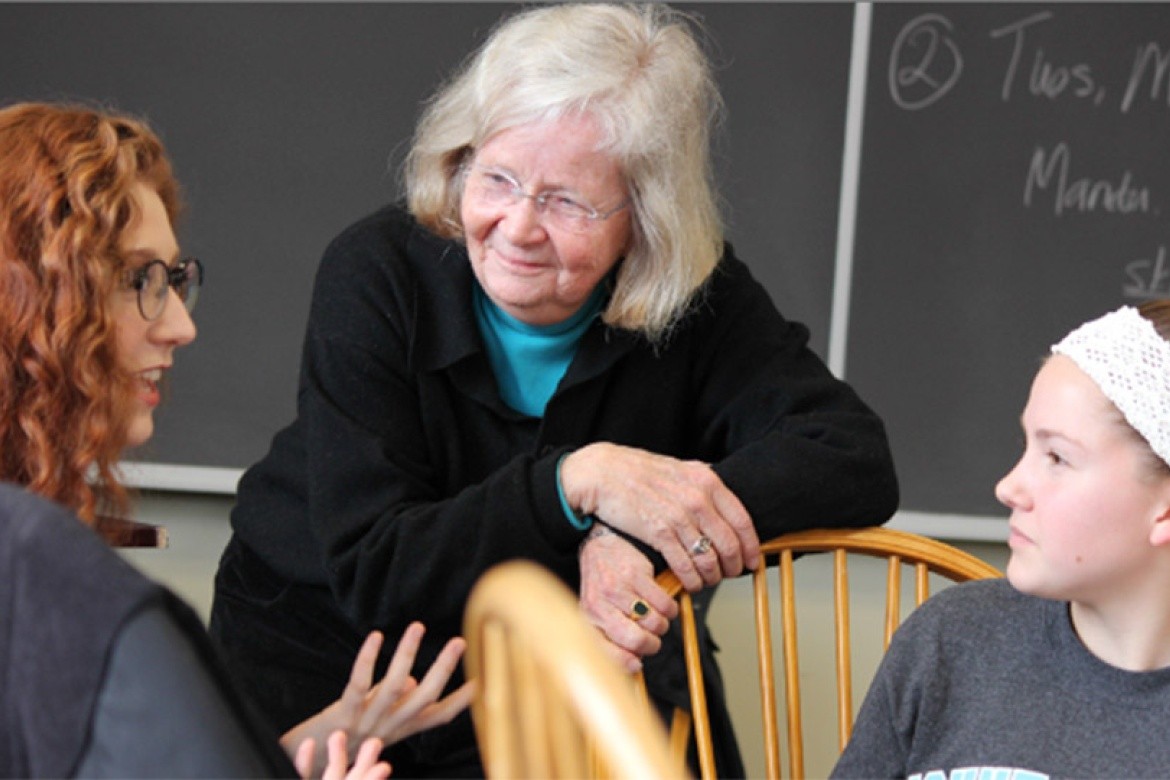Seminar examines global issues, solutions.

A first-year seminar—What in the World is Going On?—challenges students to bring their diverse experiences to bear on the planet's most complex problems.
Students in politics professor Penny Gill’s first-year seminar, What in the World is Going On?, wrestled with some big topics this spring: environmental degradation, dwindling natural resources, rampant consumerism, and the insistent march of capitalism.
The 19 students in the course—who speak 20 languages and hail from eight countries—leveraged their international experiences to examine and propose solutions to these and other global issues.
"Taking a class like this is an absolute must," said Sana Hasan of Karachi, Pakistan. "It is an eye-opener to what is actually going on in the world."
The writing-intensive and discussion-based seminar is designed to promote deep analysis across disciplines and prompt students to assess not just what is happening in the world, but also how current situations came to be. Hasan and Olivia Cacciatore of Middlebury, Vermont, both noted that much of the learning comes from listening to the viewpoints of other students.
"With everyone coming from different backgrounds, many of us with wildly different life experiences, we each have something to bring to the conversation," Cacciatore said. "Because the class focuses on the state of the world, having the world represented around the table is an amazing asset."
Discussion in the 70-minute class included ideas from sociology, religion, philosophy, psychology, and of course, politics. There were pauses—sometimes quite long ones—as students considered the intellectually complex concepts being presented, but the conversation more often flowed.
Gill, the Mary Lyon Professor of Humanities and professor of politics, knows exactly how long to wait for an answer, when to encourage one quiet student, how to prod another to think more deeply, and how to mine seemingly off-topic comments for relevant information.
Beyond saving the planet.
In two recent sessions, the class considered Naomi Klein's book, This Changes Everything … Capitalism vs. the Climate. It argues that our economic model is threatening the planet, but that humanity can rise to the challenge and build a more eco-friendly future.
"Our economic model—global corporate capitalism—is waging war against life on earth," said Gill during a recent class discussion. "This course isn't about saving the planet. The planet is fine. The problem is us."
While the subject matter can be depressing, Gill encourages the students to focus on the positive. During a recent class, she asked them, "In whose interest is it that we feel hopeless and give up on change?"
Helga Edstrom of Stockholm, Sweden, responded, "Convincing people that change is impossible is a great weapon to disarm reform movements; that's just what they want. So it's important to keep being idealistic."
Following the discussion, the class divided into pairs to propose solutions that might make capitalism more environmentally friendly. Later, students critiqued one another's ideas to sharpen their analysis.
The method worked well for Ruiwei "Wenny" Shen of Pudongxinqu, China. "Speaking is one of the most effective ways to encourage critical thinking, and being actively involved in the class made me way more confident about myself," she said.
Hasan also said the seminar "encourages me to look at different perspectives and form a holistic opinion, which helps to make my argument stronger."
Can the world be changed?
"Change will never come from the top because it's not in their self-interest to change," Gill said. "Change must come from the bottom. But there's no reason to think you can't do this.
Puyang Ma of Sichuan, China, said the course gave her hope that change is possible, and reinforced her belief that positive change starts on the local level.
"Growing up, you accept the world at face value," Cacciatore added. "This class has helped me realize that the way things are is not the way things have to stay. Never have I been more aware of the world around me, and I've never felt more capable of creating change."
Join the community. Find out how.